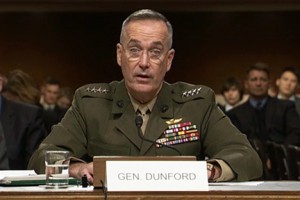SASC Hearing: Dunford Advocates for Forever War in Afghanistan
I was only able to monitor portions of yesterday’s Senate Armed Services Committee hearing in which Joseph Dunford provided an update on the situation in Afghanistan. Most of the hearing was the usual frustrating bunk, such as Roger Wicker whinging that we just don’t hear enough in the media about US successes in Afghanistan. John McCain actually was a bit more responsible than usual, showing a lot of doubt about the current set of plans and complaining that the small reserve force anticipated after 2014 is just not worth the risk to the troops if a BSA is eventually signed. Dunford’s opening statement as submitted can be found here (pdf) and the video of the entire hearing is here. What stood out at the hearing for me, though, was the entire exchange between Joe Manchin and Dunford. Here is the clip of that exchange:
In the middle of the exchange, Manchin brings up the issue of the “excess” Mine Resistant Ambush Protected Vehicles, or MRAP’s. This has been an issue I’ve followed closely, especially when I found that the US ordered nearly a billion dollars’ worth next generation vehicles while declaring a large number of usable vehicles unneeded. Several months after writing that post, I happened to overhear a conversation on an airplane in which a person claimed to have just come from Kabul, where they witnessed brand new MRAP’s coming off planes being delivered, driving across the tarmac and then being cut up for scrap. I made a few inquiries on whether this was indeed occurring (the explanation from the person on the airplane was that the purchase contracts could not be rescinded and that delivery to Kabul was a part of the contract), so the bit where Manchin and Dunford discuss them perked up my ears. Note that Dunford claims he’s saving money by scrapping them, since it costs only $10,000 to cut one up but $50,000 to ship it home. Manchin rightfully then points out that building the replacement costs a million dollars if a new MRAP is needed. Dunford then offers that sufficient MRAP’s have been moved back to the US to cover any projected needs for the next conflict that breaks out. Significantly, he states that he has discontinued the practice of cutting them up for scrap. This is the first I’ve heard about discontinuing the practice and I have to wonder if DoD was beginning to feel pressure due to word getting out about scrapping such expensive equipment. The “donation” plan is doomed from the start, since any recipients have to arrange and pay for shipment. This might not be entirely bad, though, as it may prevent a rash of these ridiculous beasts showing up in the fleets of local law enforcement agencies.
The final bit of the exchange, though, is the most telling. In their coverage of the hearing, both the New York Times and Washington Post picked up “quotables” from Manchin in the lead-up to the final exchange, but stopped short of what I see as Dunford first denying and then going all in on the concept of a forever war in Afghanistan.
My transcript of the final exchange, after Dunford had claimed there would be a time when the US would leave:
Manchin: And I’m saying if thirteen years didn’t do the job, how many more years do you think it’ll take? That’s the question I cannot answer. You know, we’re just basically saying if you can’t do the job in ten, twelve, thriteen years, you’re just not going to get the job done.
Dunford: Well, Senator, I would assume because we have vital national interests in the region, that the United States would be engaged in the region for a long period of time to come. The nature of our engagement and the nature of our presence would of course change over time.
Manchin: Again, thank you so much for your service and I would just respectfully disagree.
So although Dunford first told Manchin that there would be a time when the US could leave Afghanistan (in contrast to Manchin’s example of South Korea), Dunford then failed to put any endpoint on what would be “a long period of time to come” when the US would have such a vital interest in Afghanistan that we need to keep troops there. I’m with Manchin on disagreeing, but I can’t get to the respectful part.

